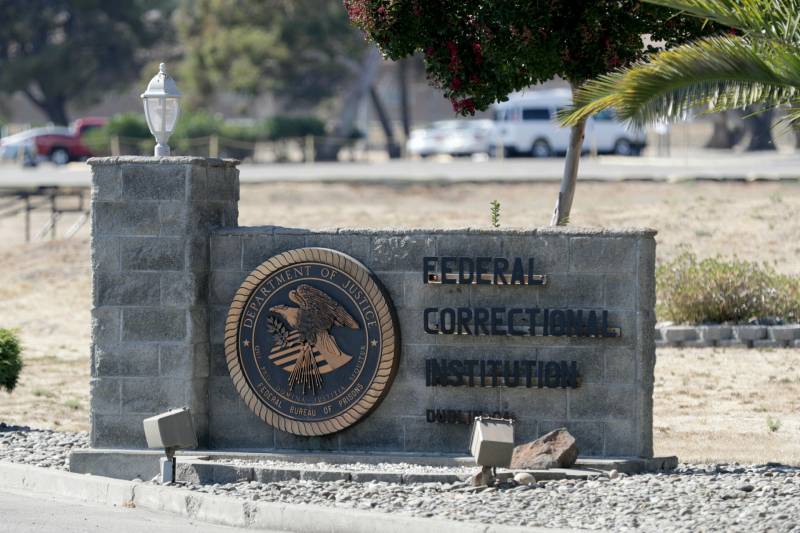One incarcerated woman said she was “overwhelmed with fear, anxiety, and anger, and cried uncontrollably” after enduring abuse and retaliation at Dublin. Another said she contemplated suicide when her cries for help went unheeded and now suffers from severe anxiety and post-traumatic stress disorder.
A culture of misconduct
All sexual activity between a prison worker and an incarcerated person is illegal. Correctional employees enjoy substantial power over those incarcerated, controlling every aspect of their lives from mealtime to lights out, and there is no scenario in which an incarcerated person can give consent.
The allegations at Dublin, which so far have resulted in four arrests, are endemic of a larger problem within the beleaguered Bureau of Prisons. In 2020, the same year some of the women at Dublin complained, there were 422 complaints of staff-on-inmate sexual abuse across the system of 122 prisons and 153,000 incarcerated people. The agency said it substantiated only four of those complaints and that 290 are still being investigated. It would not say whether the allegations were concentrated in women’s prisons or spread throughout the system.
A hotbed of corruption and misconduct, the federal prison system has been plagued by myriad crises in recent years, including widespread criminal activity among employees, critically low staffing levels that have hampered responses to emergencies, the rapid spread of COVID-19, a failed response to the pandemic and dozens of escapes. Last month, the embattled director, Michael Carvajal, announced he was resigning. On Monday, two incarcerated people were killed in a gang clash at a federal penitentiary in Texas, prompting a nationwide lockdown.
The AP contacted lawyers for every Dublin prison employee charged with sexual abuse or named as a defendant in a lawsuit alleging abuse, and tried reaching the men directly through available phone numbers and email addresses. None responded to interview requests. A government lawyer representing one of the men being sued declined comment.
Thahesha Jusino, taking over as Dublin’s warden at the end of the month, promised to “work tirelessly to reaffirm the Bureau of Prisons’ zero tolerance for sexual abuse and sexual harassment.”
She said the agency is fully cooperating with the Justice Department’s inspector general on active investigations and noted that a “vast majority” of these cases were referred for investigation by the Bureau of Prisons itself.
“I am committed to ensuring the safety of our inmates, staff, and the public,” Jusino said in a statement to the AP. “A culture of misconduct, or actions not representative of the BOP’s Core Values will not be tolerated.”
The Justice Department said in a statement that “[z]ero tolerance means exactly that. The Justice Department is committed to both holding accountable any staff who violate their position of trust and to preventing these crimes from happening in the first place.”
A criminal investigation
FCI Dublin, which is 20 miles east of Oakland, was opened in 1974. It was converted in 2012 to one of six women-only facilities in the federal prison system. Actresses Lori Loughlin and Felicity Huffman both served time there for their involvement in a college admissions bribery scandal.
As of Feb. 1, it had about 750 incarcerated people, many serving sentences for drug crimes. There are increasingly more women behind bars but they are still a minority — only about 6.5% of the overall federal inmate population.
Union officials say the vast majority of Dublin employees are honest and hardworking, and are upset that the allegations and actions of some workers have tarnished the prison’s reputation.
“We have a diversified staff. We have veterans. We have ex-law enforcement. We have good people, and they’re very traumatized,” Dublin union president Ed Canales said.
Incarcerated people and prison workers who spoke to the AP did not want their names published for fear of retaliation. The AP also does not typically identify people who say they are victims of sexual assault unless they grant permission.
Women made the first internal complaints to staff members about five years ago, court records and internal agency documents show, but it’s not clear whether those complaints ever went anywhere. The women say they were largely ignored, and the abuse continued.
One incarcerated woman who reported a 2017 sexual assault said she was told nothing would be done about her complaint because it was a “he said-she said.” The woman, who is now suing the Bureau of Prisons over her treatment, said she was fired from her prison commissary job as retaliation. When she went to report her firing, she said a Dublin counselor took her abuser’s side, responding: “Child, do you want him to lose his job?” The woman was moved to a different prison a week later.
In 2019, another Dublin incarcerated woman sued — first on her own with handwritten papers, then with the backing of a powerful San Francisco law firm — alleging that a maintenance foreman repeatedly raped her and that other workers facilitated the abuse and mocked her for it. When an internal prison investigator finally caught wind of what was happening, the woman said she was the one who got punished with three months in solitary confinement and a transfer to a federal prison in Alabama.
Then, in 2020, another incarcerated woman’s report that Dublin workers were abusing inmates broke through to the Justice Department’s inspector general and the FBI, triggering a criminal investigation that has led to the arrest of four employees, including former warden Ray J. Garcia, in the past seven months. They each face up to 15 years in prison, though in other recent cases, sentences have ranged from three months to two years.

